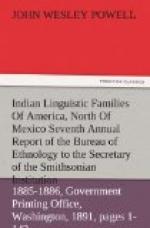= Attacapas, Gallatin in Trans. and Coll. Am. Antiq. Soc., II, 116, 306, 1836. Gallatin in Trans. Am. Eth. Soc., II. pt. 1, xcix, 77, 1848. Latham, Nat. Hist. Man, 343, 1850 (includes Attacapas and Carankuas). Gallatin in Schoolcraft, Ind. Tribes, III, 402, 1853. Buschmann, Spuren der aztek. Sprache, 426, 1859.
= Attacapa, Latham in Proc. Philolog. Soc. Lond., II, 31-50, 1846. Prichard, Phys. Hist. Mankind, V, 406, 1847 (or “Men eaters"). Latham in Trans. Philolog. Soc. Lond., 105, 1856. Latham, Opuscula, 293, 1860.
= Attakapa, Latham in Trans. Philolog.
Soc. Lond., 103, 1856. Latham,
Opuscula, 366, 1860. Latham, El.
Comp. Phil., 477, 1862 (referred to
as one of the two most isolated languages
of N.A.).
= Atakapa, Gatschet, Creek Mig. Leg.,
I. 45, 1884. Gatschet in
Science, 414, Apr. 29, 1887.
Derivation: From a Choctaw word meaning “man-eater.”
Little is known of the tribe, the language of which forms the basis of the present family. The sole knowledge possessed by Gallatin was derived from a vocabulary and some scanty information furnished by Dr. John Sibley, who collected his material in the year 1805. Gallatin states that the tribe was reduced to 50 men. According to Dr. Sibley the Attacapa language was spoken also by another tribe, the “Carankouas,” who lived on the coast of Texas, and who conversed in their own language besides. In 1885 Mr. Gatschet visited the section formerly inhabited by the Attacapa and after much search discovered one man and two women at Lake Charles, Calcasieu Parish, Louisiana, and another woman living 10 miles to the south; he also heard of five other women then scattered in western Texas; these are thought to be the only survivors of the tribe. Mr. Gatschet collected some two thousand words and a considerable body of text. His vocabulary differs considerably from the one furnished by Dr. Sibley and published by Gallatin, and indicates that the language of the western branch of the tribe was dialectically distinct from that of their brethren farther to the east.
The above material seems to show that the Attacapa language is distinct from all others, except possibly the Chitimachan.
BEOTHUKAN FAMILY.
= Bethuck, Latham in Trans. Philolog.
Soc. Lond., 58, 1856 (stated to
be “Algonkin rather than aught else").
Latham, Opuscula, 327, 1860.
Latham, El. Comp. Phil., 453,
1862.
= Beothuk, Gatschet in Proc. Am.
Philosoph. Soc., 408, Oct., 1885.
Gatschet, ibid., 411, July, 1886 (language
affirmed to represent a
distinct linguistic family). Gatschet,
ibid., 1, Jan-June, 1890.
Derivation: Beothuk signifies “Indian” or “red Indian.”
The position of the language spoken by the aborigines of Newfoundland must be considered to be doubtful.




